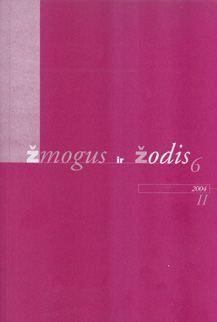Eilėrastis – poeto vizitinė kortelė
A Poem as a Visiting Cardv
Author(s): Petras BražėnasSubject(s): Literary Texts
Published by: Vytauto Didžiojo Universitetas
Keywords: poem; image; historical associations; aesopic language; cultural resistance.
Summary/Abstract: The object of the article is a poem Rugiaveidė (The Lyme-grass) written by the Lithuanian poet Alfonsas Maldonis. Analysing and interpreting the poem the author tries to show not only one of the most characteristic features of A.Maldonis creative individuality, one of the most outstanding trends of his artistic search but also a peculiar feature of the poetry of Soviet times when the spirit of cultural resistance was described in ciphered form and aesopic language. The images of nature, the pulsation of emotions, historical associations are melted in the furnace of one idea. A modest, poor plant of the sands has got the Lithuanian name with joint “rye” and “face” semantics. Caught by the real inspiration the poet creates new meanings: ”face” is associated with nation, homeland; “rye” conveys the meaning of bread, the bread of word, historical experience of the nation, its spiritual state, its future. Disclosing his emotional and reflective talent of a lyric poet, embodying his human belief Alfonsas Maldonis created the poem impressively expressing historical memory, national self-consciousness, spiritual experience and the idea of the patient, stoic resistance to historical fate and strong belief in survival.
Journal: Žmogus ir žodis
- Issue Year: 06/2004
- Issue No: 2
- Page Range: 14-21
- Page Count: 8
- Language: Lithuanian

